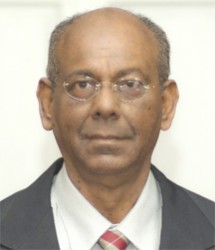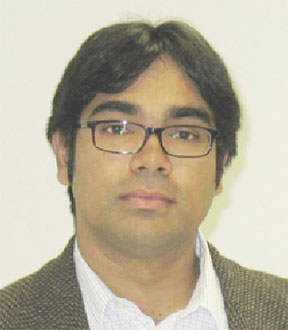Citing the political and ethnic divide in the country, economist Tarron Khemraj and political analyst Ralph Ramkarran say that co-operation between the two major parties is required if Guyana is to escape the natural resource curse that could threaten benefits from the impending oil economy.
In his Business Page column in yesterday’s Sunday Stabroek, Khemraj argued that the projects necessary for escaping the curse will require political cooperation.
He said some kind of arrangement will be required to allow both the elites of the PNCR and PPP/C to claim joint ownership of the big ticket infrastructure projects and any future new industry outside the oil and gas sector. He posited that having first-world infrastructure will not necessarily change the structure of exports and production, but is a necessary start. In spite of the developed physical infrastructure of an established oil economy like Trinidad and Tobago, Khemraj said that that country still depends on oil and gas for most of its export earnings.

The resource curse generally refers to the paradox that countries with abundant natural resources like fossil fuels tend to have lower economic growth, less democracy, and poorer development outcomes than countries with fewer natural resources.
Khemraj warned that any political consensus outside of a binding constitutional arrangement will not work, especially the opportunistic type of agreement like the Cummingsburg Accord which formed the basis for the coalition between APNU and the AFC which won the 2015 general elections. He argued that the likelihood of reneging is very high if cooperation is not enshrined in a new constitution. Further, reneging is almost certain given the nature of the core support of the PPP/C and PNCR. He said that the present constitution allows for consensus through committees but this is not sufficient as it does not allow for joint elite ownership of the big development projects.
Writing under the heading `Political cooperation is necessary for escaping the natural resource curse’, Khemraj said “Most of Guyana’s political troubles originate from the fact that the main parties derive a significant percentage of their support from one of the two dominant ethnic groups. In the past, I have labelled this strategic pro-ethnic voting. Most Guyanese, but not all, vote to keep the other side out of power. This does not mean they are bad people. It implies that these folks are faced with limited trust and information about how the other side will vote in secret ballot. Therefore, the safe strategy is for many to vote for their respective leaders who they perceive will look after their economic interests. The group that wins has a sense of victory and demands economic rewards. The group that loses has traditionally expressed a feeling of marginalization and discrimination, real or perceived”.
The principle is the same, he said, for inter-group political rivalry.
“The winners discount the future at a lower rate compared with the losers. This is because the winners perceive better returns since their kith and kin are the leaders. The losers take the opposite position as they perceive their interests are under threat. This difference in subjective discount rate has serious implications for long-term economic growth. Commonsense tells us that if we can get everyone to have a level of optimism somewhere between the high and low discount rates, the economy will grow faster in the long-term. Hence, political consensus and cooperation are necessary to get everyone marching at the same rate, thus boosting economic growth in a sustainable manner. Oil revenues will no doubt boost growth, but not necessarily in a sustainable manner”, he contended.
He cautioned that elite cooperation enshrined in a new constitution is not without its risks as any political cooperation between the PNCR and PPP/C will result in an authoritarian government, as these are instinctively authoritarian parties. The recent firing of columnists Dr David Hinds and Lincoln Lewis from the state-owned Guyana Chronicle, he said, underscores the authoritarian instincts of the PNCR and the derivative politicians in AFC.
Khemraj said that the new sizable multi-ethnic group of voters in Guyana presents an opportunity for providing credible electoral challenges to the incumbents should constitutional overhaul present an authoritarian power sharing system.
“The independent voters of Guyana will have to play this crucial role as challenger even if there is no constitutional overhaul to promote cooperation. Otherwise, I am extremely pessimistic that Guyana can escape the resource curse since the political will does not appear to exist in the PPP/C and PNCR for shaping a new law of the land”, Khemraj said.
In his column entitled `The root of the evil’, Ramkarran argued similarly that because of the existence of two large race groups which are in political competition, stemming from economic competition for scarce resources, electoral success by one group is seen not merely as a reversible electoral loss.
“It is seen as devastating to the political and economic security of the other group. With one group in power, it is accepted as fact that discrimination and marginalization will take place against the other group. One group is alleged to have economic power which, coupled with political power, harms the progress of the other group by discrimination. The other group is alleged to have administrative/ bureaucratic/security power, and that with political power it discriminates and suppresses the other group. These narratives, whether true or not, have been with us since 1957 – for 60 years. They are not going to go away”, Ramkarran, a former two-term Speaker of the National Assembly, argued.
He said that the struggle for political office has an additional dimension here.
“Since the politics is based in ethnic competition, the struggle for political office becomes a struggle for ethnic dominance. An electoral victory is not seen as a victory for the political left or the political right, or for social democracy or liberal democracy, or for left wing or right wing economic and political policies. It is seen in purely ethnic terms – which ethnic group gains dominance. That is the root of the evil in Guyana’s politics”, Ramkarran, a former longstanding member of the PPP, argued.
He stated that Guyana cannot achieve the economic progress and the growth of the economy at a sufficiently rapid rate to deal with the problems of the society unless this ethnic competition is channelled into constructive streams and the fears are substantially reduced.
“In looking to the future, the impact of the oil economy needs to be considered. The income flow of 500,000 barrels of oil a day, or perhaps more, will transform the economic possibilities for Guyana. But unless a political solution is found to the ethnic issue, no matter which party is in office, the Dutch disease will rapidly overtake Guyana, corruption will explode, bad governance will continue, the rich will become richer, and the poor will have to satisfy themselves with being the left behind stragglers catching the crumbs as labourers, semi-skilled workers and service providers at the lower end, eking out a livelihood. Oil wealth will pass them by”, Ramkarran declared.
He said it is a great tragedy that the APNU+AFC government has abandoned its manifesto promise of constitutional reform which, with modifications, would have harnessed the ethnic competition into constructive efforts and would have eliminated the suspicions over elections. “APNU+AFC had the chance of transforming Guyana’s economy, politics and society, charging into history as the true builder for which Dr Ptolemy Reid praised Founder Leader Forbes Burnham. But instead, APNU+AFC has now chosen to let history pass it by, seeking APNU+AFC, not national solutions, with a one seat majority, in a country divided by a partisan gorge. This government, refusing to honour its own manifesto pledge to the Guyanese people, will end up as no more than a footnote in Guyanese history”, Ramkarran stated.










